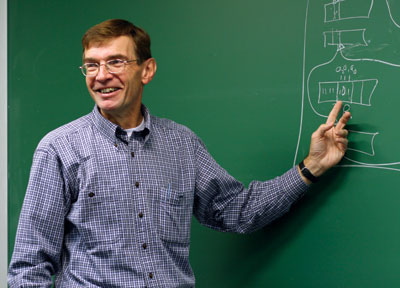“What you want to raise is a group of students who don’t worship what is known, but question it.”

Forty-five minutes into an interview in the College’s media center, Professor David Maharry pulls back the left sleeve of his white cotton Oxford dress shirt and glances at his watch. Students are meeting him at his office in a few minutes, he explains. They’re preparing for their final exam.
And his.
That Thursday final will be the last exam the professor of mathematics and computer science will give before he retires from the College.
“They’ve been working real hard, but they still have a ways to go, so we’re going to work together on it for a while,” he says.
“Working together” with students has kept Dave Maharry looking forward to coming to campus for 31 years. The man who established the computer science program at Wabash has been a constant in the Wabash community—teaching and tutoring students, encouraging faculty colleagues, helping the mathematics department through various changes over the years, volunteering and being the citizen of Wabash and Craw-fordsville we hope Wabash students will be for their own places of work and living.
So it’s surprising to hear that what he lives for these days is “the unexpected.”
“I’ve begun exploring discrete mathematics [the branches of mathematics that deal with quantities that have discrete, rather than continuous, values]. In fact, for the past four or five years I’ve taught more discrete mathematics, which comes out of computer science, than computer science itself,” Maharry explains with an enthusiasm his students know well.
“In discrete math you get to an answer you never would have anticipated at the start. A surprise!”
He’s suddenly emotional as he describes an interview he heard recently on public radio with Archbishop Desmond Tutu.
“He was talking about the God of the unexpected, the God of the surprise. I don’t mean to make this too religious, but the unexpected, the surprise, is what’s fun about whatever you’re investigating. I find that in math and computer science. Wherever you see something and you say, ‘Ah, I wonder why that is?’”
That curiosity and the mathematical skills to study those things that evoke it have been Maharry’s greatest gift to his students.
“One of my favorite quotes comes from Jacob Bronowski; I have the quote on the wall in my office. He says what you want to raise is a group of students who don’t worship what is known, but question it. The idea ought to always be, Why is that true? If that is true, what does that mean over here?”
But how can that questioning attitude be taught?
“I think it’s contagious,” Maharry says. “I think you pass that along by being open about how you are. I talk to the guys about things—sometimes things pretty off- the-wall. If something pops into my head about what we’re doing, even in the middle of class, I’ll see something interesting and follow it, go after it. I’m not afraid to do that.”
He smiles.
“Of course, it can be distracting. During a recent calculus class the topic was tangent lines and functions, and I asked the students, ‘What does tangent mean?’ They answered. Then I asked, ‘What does it mean outside of math?’ And one student raised his hand and said, ‘You mean like when you go off on a tangent?’”
Maharry laughs.
“I said, ‘Yes, you’ve got it!’ But those tangents can lead to interesting conversations. It also keeps you thinking. It’s important to be curious about things, to investigate a little more deeply. The heart of science isn’t when you get the answer—the heart of science is when you get, ‘Well, I didn’t expect that!’”
Maharry has found computer science at Wabash a fruitful field to practice the pursuit of surprise with students.
 Forty-five minutes into an interview in the College’s media center, Professor David Maharry pulls back the left sleeve of his white cotton Oxford dress shirt and glances at his watch. Students are meeting him at his office in a few minutes, he explains. They’re preparing for their final exam.
Forty-five minutes into an interview in the College’s media center, Professor David Maharry pulls back the left sleeve of his white cotton Oxford dress shirt and glances at his watch. Students are meeting him at his office in a few minutes, he explains. They’re preparing for their final exam.